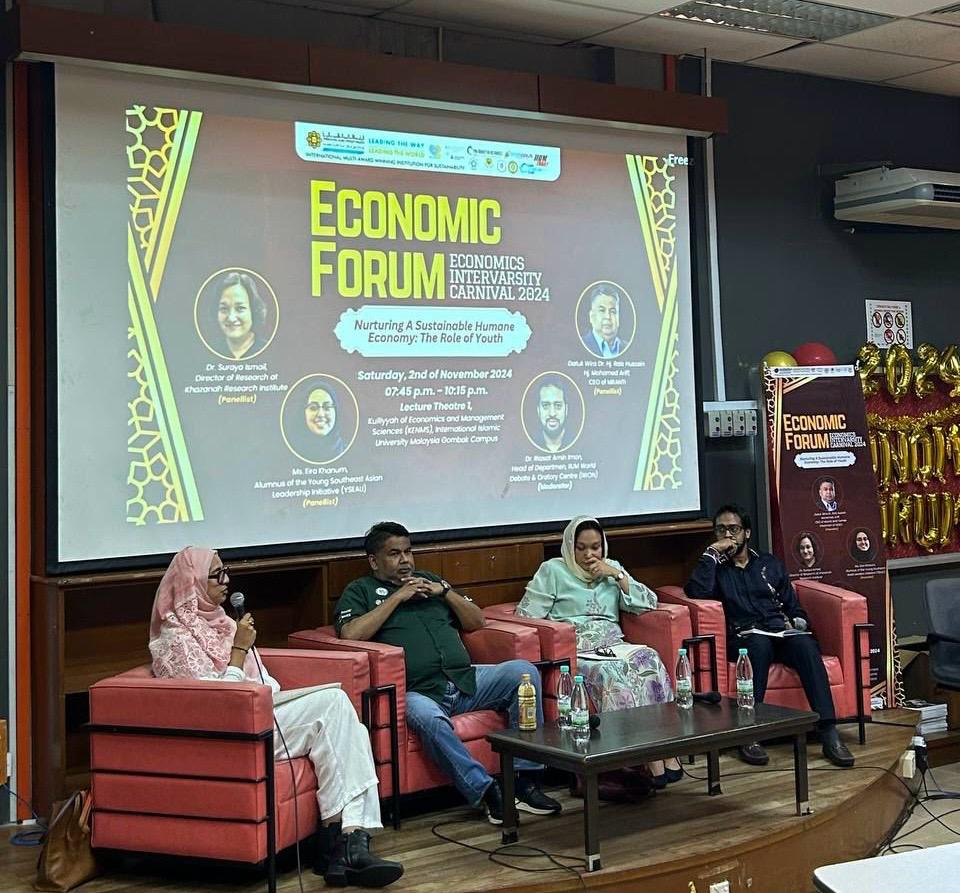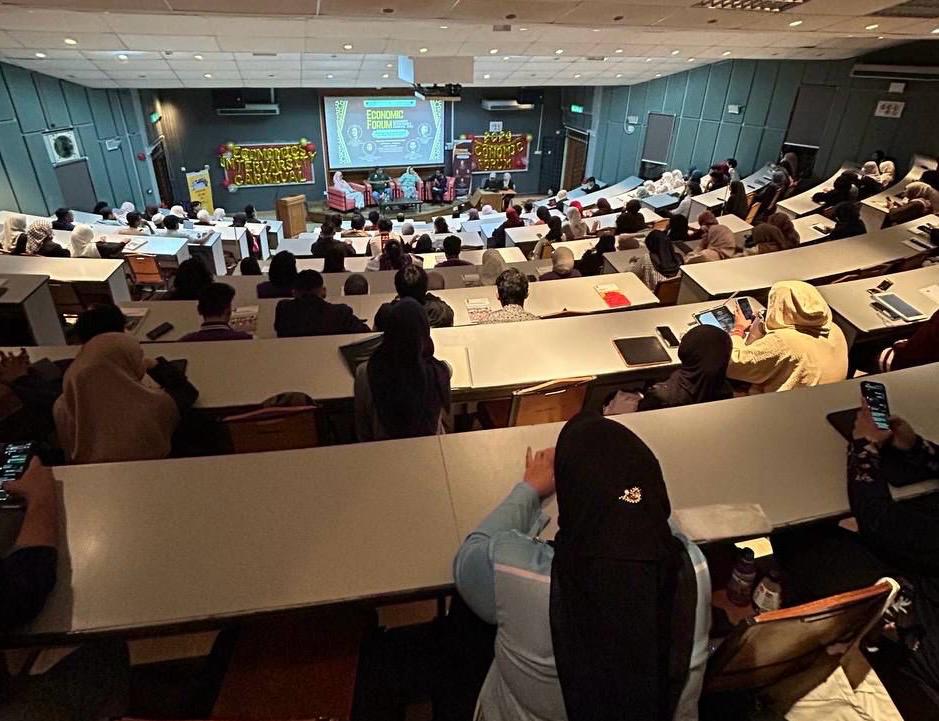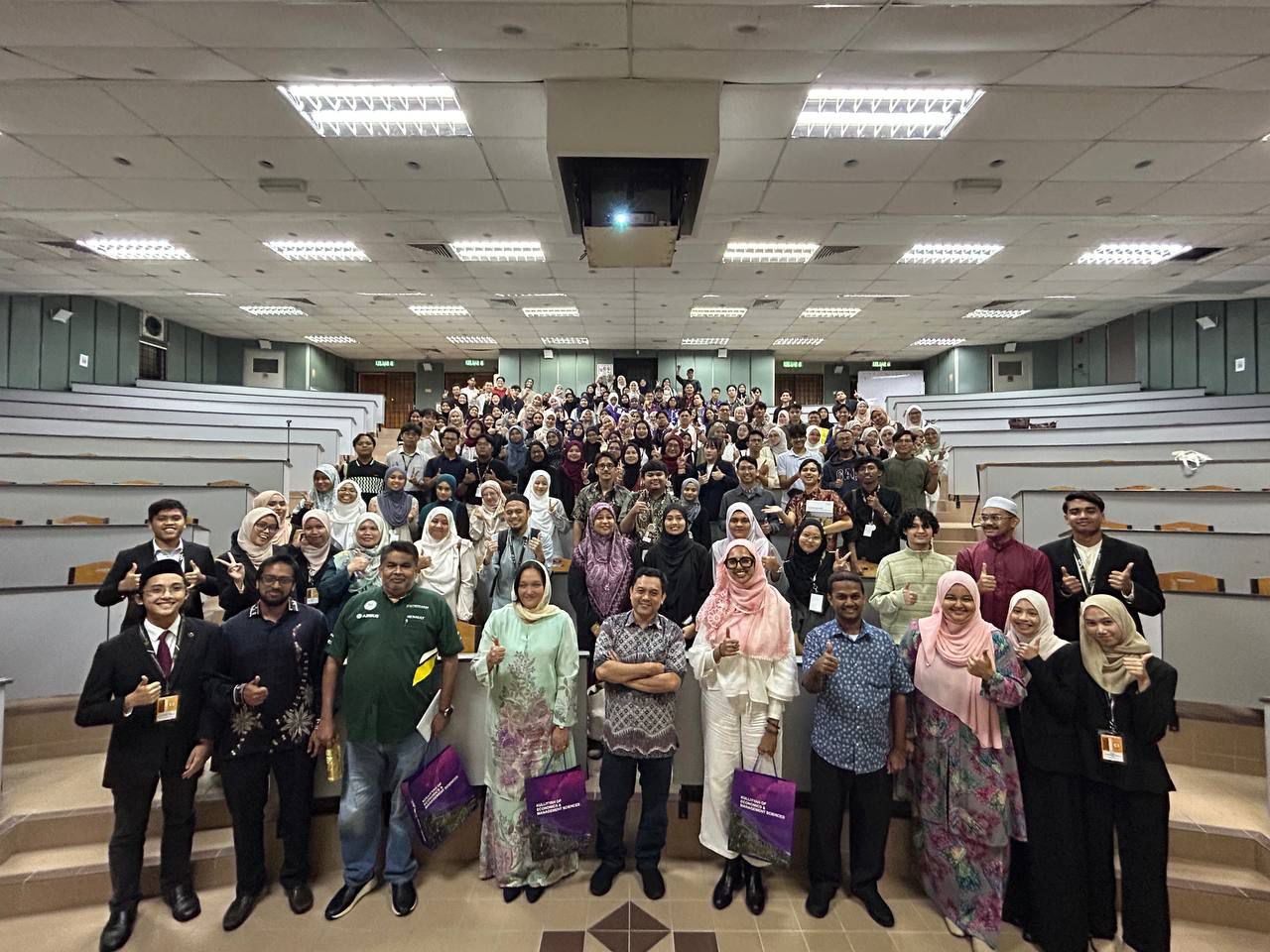By, Adlina Kamal
GOMBAK, 13 December 2024: The Economics Intervarsity Carnival (EIC), one of the flagship events of the Kulliyyah of Economics and Management Sciences (KENMS), brought together students and thought leaders to engage in enriching discussion on the role of economics in shaping society. Among the highlights of the event that was held from 1 to 3 November 2024 at IIUM Gombak was a forum titled, “Nurturing a sustainable Humane Economy: The Role of Youth,” on 2nd of November 2024.
The forum featured three distinguished panelist of speakers who shared their insights on the challenges and opportunities in building a sustainable and humane economy. “Having this forum can help IIUM in achieving the second IIUM Mission in which to have a sustainable economy in Muslim world,” said Prof. Dr. Gairuzazmi Bin Mat Ghani, Dean of KENMS. Together, the panelists shared their expertise in technology, policy and sustainability to inspire youth for a humane and sustainable economy.
Datuk Wira Dr. Hj. Rais Hussin Hj. Mohamed Ariff, CEO of the Malaysian Research Accelerator for Technology and Innovation (MRANTI), is a well-expert technologist, advisor and communicator with 28 years of experience and has successfully launched and scaled initiatives in both for-profit and non-profit sectors pioneering advancements in global ICT and telecommunication. Dr. Suraya Ismail, Director of Research at Khazanah Research Institute is a key figure in policy development, focusing on sustainable housing, urban development and public welfare through collaborations with global institution like UN-Habitat. Ms. Eira Khanum, an independent researcher and YSEALI alumna has driven projects adressing climate change’s cultural impact, gender equity and sustainable development, including Malaysia’s National SDG Roadmap.

Datuk Wira Dr. Rais Hussin emphasized the next generation holds the power to redefine the future economy. He encouraged the youth to think innovatively and adopt a balanced approach that aligns economic growth with environmental, reflecting the Islamic principle of wasatiyyah (moderation). Meanwhile, Dr. Suraya Ismail highlighted the critical role of youth in serving the nation. She stressed that as the leaders of tomorrow, young people must harness their potential to contribute to the country’s development. Eira Khanum reinforced the need for sustainability in the economy, emphasizing integrity and accountability as foundational elements. She advocated for these values to guide the creation of a humane and sustainable economy, ensuring long-term social benefits.
The discussion underscored the significant influence youth have in driving change and achieving a future that balances prosperity with responsibility. However, Datuk Wira Dr. Rais Hussin raised a critical point about the pervasive issue of corruption, emphasizing that this challenge begins at the grassroots level. He explained that corruption can destroy a nation by eroding trust, misallocating resources, and weakening governance. It stifles economic growth, fosters inequality, and creates inefficiencies that harm public services like education and healthcare.
The narrative of policymakers, Eira Khanum noted, is pivotal in addressing this issue, as their role should be grounded in accountability and integrity. She highlighted that accountability should start from a young age, noting how even in academic settings, issues like “free-riders” in group assignments reflect a lack of responsibility and fairness. “Corruption exists in our surroundings, among peers and in our communities,” she said, warning that this behavior, if unchecked, can escalate into larger societal problems. By nurturing integrity and accountability early on, we can cultivate a generation that rejects corruption and works toward a sustainable, humane economy.

Datuk Wira Dr. Rais Hussin delved into the “nightmare of AI,” describing the tectonic shift technology is bringing to our lives. He cautioned that many jobs are at risk of being replaced by AI, urging the youth to adapt and evolve alongside technological advancements such as FinTech. He called on the youth to step up, learn, and prepare to become the leaders of tomorrow.
Dr. Suraya Ismail shed light on the growing issue of household debt, which poses significant risks to the economy and could burden future generations with overwhelming loan obligations. She emphasized the importance of continuous learning, encouraging the audience to read more books, seek knowledge, and gain clarity about their vision. Exposure to diverse experiences and perspectives, she noted, is essential for developing a well-rounded understanding of the world.
Eira Khanum echoed the need for the youth to go beyond their comfort zones, urging them to build connections, learn from external environments, and think with values that prioritize integrity and accountability. This, she believes, is key to nurturing a sustainable economy rooted in humane principles. Collectively, the panelists called on youth to take charge of their future by embracing knowledge, values, and innovation.

By moving away from dependency on politicians and focusing on leadership, the next generation can shape a balanced economy that benefits both people and the planet. Datuk Wira Dr. Rais Hussin urged the youth to step up as leaders, embrace innovation, and lead responsibly, especially in the face of technological advancements like AI. Dr. Suraya Ismail highlighted the risks of household debt for future economy and stressed the importance of lifelong learning and gaining exposure to develop a clear vision for national development. Ms. Eira Khanum encouraged youth to step outside their comfort zones, build connections, and uphold values of integrity and accountability, essential for a sustainable economy. Together, the panelists inspired the audience to prioritize knowledge, values, and innovation to create a prosperous and sustainable future.***
- KAED Fun Run 2025: Celebrate Togetherness and Inclusion - November 5, 2025
- When Learning Meets Opportunity: ReSkills Sponsors COMM Fest 2025 - June 5, 2025
- Planting Seeds for a Better Tomorrow: KENMS and TSG Collaboration - January 9, 2025
